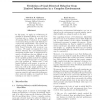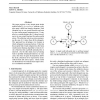46 search results - page 4 / 10 » Measuring and Optimizing Behavioral Complexity for Evolution... |
GECCO
1999
Springer
14 years 2 hour ago
1999
Springer
In this paper, we apply an evolutionary algorithm to learning behavior on a novel, interesting task to explore the general issue of learning e ective behaviors in a complex enviro...
GECCO
2003
Springer
14 years 28 days ago
2003
Springer
Abstract. Many multi-robot systems are heterogeneous cooperative systems, systems consisting of different species of robots cooperating with each other to achieve a common goal. T...
AAMAS
2005
Springer
13 years 7 months ago
2005
Springer
Cooperative multi-agent systems are ones in which several agents attempt, through their interaction, to jointly solve tasks or to maximize utility. Due to the interactions among t...
ICML
2003
IEEE
14 years 8 months ago
2003
IEEE
The paper explores a very simple agent design method called Q-decomposition, wherein a complex agent is built from simpler subagents. Each subagent has its own reward function and...
GECCO
2009
Springer
14 years 10 days ago
2009
Springer
Typical domains used in machine learning analyses only partially cover the complexity space, remaining a large proportion of problem difficulties that are not tested. Since the ac...


